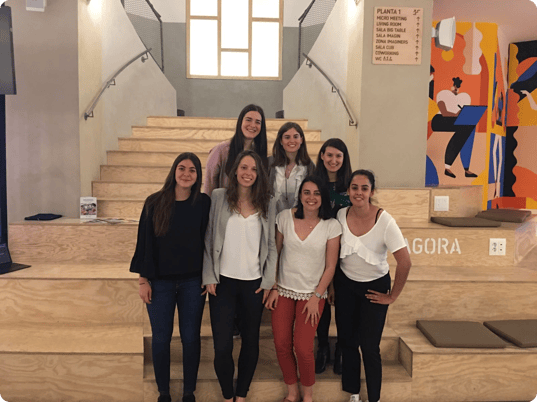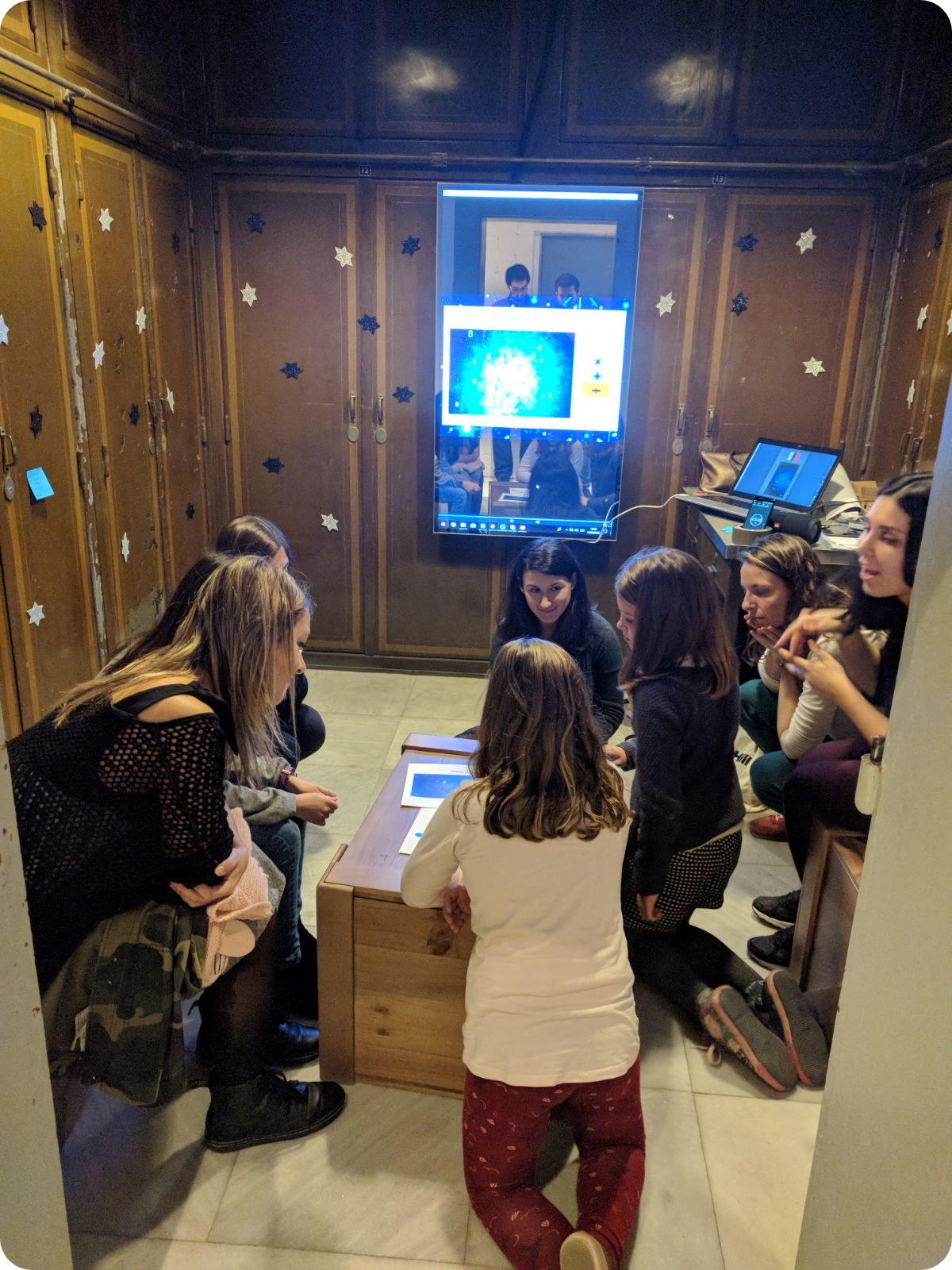1 vs 3 is the number of women as opposed to that of men working in the IT sector. Haven’t you ever asked yourself why there are so few of them in this sector? The technological sector is wasting a very valuable talent contribution, and it seems to be careless about it. But we do care. And we do everything within our reach to incorporate women in technical careers, and later on, help them in the professionalisation of all the acquired knowledge. That's why in this post, we have interviewed Mónica Manzanares, a betweener who is part of Young IT Girls, a project that promotes technological vocations among girls. Do you want to know more about this initiative?
Interview with Mónica Manzanares, mechanical engineer at BETWEEN and co-founder of YITG

Mónica Manzanares is a mechanical engineer, and is very aware of the promotion of technical vocation among girls. She firmly believes that women who work in these fields are able to motivate the new generations so that, in the future, the number of women increases in the technological sector.
1. What is Young IT Girls?
Young IT Girls is a non-profit organization the goal of which is to promote technological vocations among girls. We are young engineers and professionals in the ICT field, we have an enterprising attitude and we are willing to transmit our inquisitiveness about the sector and find tools to inspire young girls’ future decisions.
In the fashion world, the term It Girl has acquired a very relevant influence. This term is associated with extraordinary women who stand out because of their style. IT also stands for Information Technology, and it’s an acronym that makes reference to technological or technical women. Therefore, IT Girls is the empowerment of women in this field of the future.
2. How did you come up with the idea of creating Young IT Girls?
One day, a friend from the university called me and another friend of mine and told us that a friend of hers had come up with the idea of creating an association for carrying out different activities specially aimed at young girls and teenagers with the aim of inspiring technological vocations and strengthening their self-confidence in their technological capacities. This is how the three of us, together with four other girls, created Young IT Girls.
A few months later, and thanks to the great support we have been receiving, the association has grown, and right now we are twenty girls with different professional profiles.

3. What is the association's goal?
Its main goal is that young girls really get to know the opportunities they have within the ICT sector. We want to transmit them the need to have an enterprising attitude and also encourage them to use the learn by doing philosophy. In short, our aim is to awaken the technological vocation in girls by boosting an interest that they don’t even know they have. In addition, we also work towards stimulating a mentality change that helps boost potential and opportunity equality among youngsters.
<<< Haven’t you ever asked yourself why there are so few women in the technological sector? >>>
4. You are entrepreneurs, what has susprised you the most until now, and what has this initiative taught you so far?
What has surprised me the most is that most girls don’t even consider taking a technological degree, either because they lack the information on its content or because they don’t have enough information on the career prospects these degrees can offer them, and sometimes it’s just because they are afraid of ‘not being up to scratch’.
5. When you were a young girl, did somebody talk to you about this kind of degrees? How did you decide to become an industrial engineer?
I don’t remember hearing the word engineering at least until high school. There were no engineers among my relatives or closest friends and acquaintances, so I just didn’t have that option in mind. A few years later, when I was 16, which is when you need to choose your study itinerary (at my school we only had two options, either science or humanities), I ended up choosing the scientific one.
When I got my diploma in science and once I had taken the university entrance exam, it was time to choose a degree. I finally opted for Industrial Engineering because I was good at maths and physics, but I honestly didn’t know what I wanted to do with my professional career yet…. and I thought that this engineering degree was the most generic one and that by choosing it I would have more time and information in the future so as to finally decide which profession to choose.
Actually, like many people who decide to take this or other engineering degrees, I started it with almost complete ignorance of what it exactly represented. I think that pre-university students willing to take an engineering degree should get more specific information on all the options they have, so there’s still a lot of work to do in this sense. In the end, everybody knows what a doctor, or a lawyer, or a teacher do… but it’s hard to explain what an engineer does, since the career prospect is very broad.
6. Why do you think there are so few women in the technological sector?
We have asked ourselves the same question in the organization, and we always find new reasons, but in my opinion, the three main ones are:
- The lack of female role models at a technological and scientific level, both in the family/friend and public environments. And this doesn’t mean that there are not or there haven’t been any of them, it’s just that with regard to public figures, it looks like women need to do much more than men in order to get the same acknowledgement. It’s as if we always had to proof a bit more than them…
- Regarding the presence of techie women in our closest environments, it looks like every day it is a bit easier that we all know or are acquainted to a female engineer. It wasn’t like these, for example, when my grandparents were younger, since there were male engineers, but it was inconceivable that a woman could end up being an engineer… Women could hardly take a degree!
- The mentality difference between a man and a woman. Generally, men tend to be more determined and less reflexive when it comes to making a decision, while us, women, usually think further and find harder getting involved in those things we believe to be more difficult or hard to control. When you consider taking a technological degree, the input you receive from almost everyone is that these are hard degrees that require a great effort. From my point of view, when faced with these opinions, many women feel fear of failure and don’t think themselves capable of being able to do it, while men take the risk without thinking too much about it.
This is a point in which we, Young IT Girls, would like to work on, since we think it is essential that we open up the eyes of many young girls and teach them how to trust themselves so that they don’t feel intimidated and so that they are aware that they have the same possibilities as a man of being successful in the ICT world.
Women tend to lean towards degrees in which the human and social aspects are very visible. In a technological profession, even though these aspects are present too, they are not as evident as in other professions, and the fact of not being aware of this ‘human side’ makes many girls dismiss these degrees due to the mistaken thought that if they study an engineering degree, the professional world awaiting for them will be summarised in being ‘lab rats’ or ‘freaks who spend all day long in front of the computer’…
That’s why from YITG we would like to help make visible the great potential of technological innovation and how its impact in all environments is greater every day, whether we talk about medicine or humanitarian and social ends. We believe that by raising young girls and female teenagers’ awareness on this issue we can make many of them lean towards a technological degree once they see that these also a trigger the improvement of life quality.

7. How can your initiative help the technological sector?
We believe that the fact of being young female engineers and professionals within the ICT field with an enterprising attitude makes our public see us as role models, which is something that helps us be able to transmit their concerns on the sector and find new tools to inspire them in their future decisions.
Increasing the number of women in this sector will make it grow and improve in equality terms. It is not possible that in such an important sector like the technological one, almost half of the population doesn’t have a minimum representation and that, in addition, this collective doesn’t almost have decision-making capacity at an executive level.
8. What have you noticed amog girls? Do they know anything about STEM degrees? Or do they know nothing about them?
The truth is that young girls don’t have a lot of information about them, probably because of the influence of their TV idols. If you ask them what they would like to be when they are very young, the answers are usually: a princess, a hairdresser, a vet, a doctor, etc. but none of them wants to be an engineer. And it’s not bad that they want to be what they say they would like to be, but it’s a pity that they don’t want to be engineers because they absolutely ignore what being an engineer is, because there are no TV shows or movies which show a normal girl with this role.
Since we cannot want to be something we completely ignore that exists, it is necessary that young girls have various role models where to see themselves reflected, females of different ages and profiles with different professional careers that can help them discover whether they have a technological vocation or not. Evidently, depending on the age, we can’t expect to explain to a young child what an engineer is because it is quite absurd, but we need to show them that subjects such as maths and science can be entertaining and useful. And, above all, we need to show them that these subjects are not an end, but a means to achieve things that can help improve people’s lives.
![]()
9. Which activities have you carried out until now?
We’re currently at the end of our entity’s defining process, and we’re gathering as much information as we can to know exactly where to attack. During this period of time is when we have found out that we need to work with young girls from the early stages so that they feel self-confident, and we need to show them with easy examples the possibilities they have if in the future they decide to take this kind of degrees.
Regarding the activities we have carried out, I would point out our participation in the SheHacks event, where we presented a kind of scape room for the youngest ones in which the girls had to fix different parts of a spacecraft that was travelling through time by answering logic, maths and science easy questions. It was an awesome experience from which we learned a lot.
We have also carried out a couple of activities as a pilot test at schools and high schools giving talks and/or adapting the scape room’s difficulty to the age group of the participants.
We have also run interviews for different communication media or entities to make ourselves known and present them our collaboration availability.
10. What are your future plans?
We would like to start the school year to the fullest by going to schools and high schools to do more activities, to give talks ourselves or to take with us a guest female engineer who can serve as a role model and talk about her experience to inspire young girls and female teenagers to follow her steps.
We’re also thinking of attending next year’s YOMO, apart from other technological events.
11. Do you think that companies should get involved to help improve this situation?
I think that many of them are already doing it, and they are doing it very well. But I also think that wanting to equalise percentages no matter what, is a big mistake too. From my point of view, companies must hire the person who is better prepared for the task he/she is being hired for, independently of his/her gender, or if she’s a woman who because of her age could possibly get pregnant, etc. What we need is to increase the number of women who present their candidacy to this kind of jobs, which will mean that there are more women with technological degrees.
My opinion is that companies from this sector should be in closer contact with schools and high schools to give visibility to their work, make it attractive and motivate those girls who would like to get there.
12. How could BETWEEN help you with your project? What are your expectations?
Companies from the sector, like BETWEEN, share the inquisitiveness and goals of YITG since, every day more, the world needs more professionals with ICT profiles and, therefore, the sector needs ICT women. And it’s not just because girls represent half of the total population of the new generations, but also because they contribute with different and supplementary values and ways of working.
Incorporating companies within the YITG ecosystem helps us reach the end of the cycle by getting young girls and female teenagers in touch with the labour market at the same time that it enables us to link YITG’s tasks to the activities and programmes that some companies are already encouraging with the aim of generating synergies and maximising its global impact.




